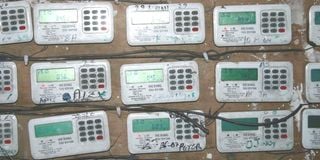Premium
MPs push for Kenyans to buy electricity meters directly from private companies

Kenya Power has been facing a severe shortage of meters, which has frustrated those seeking new meters and replacements for faulty or stolen ones.
Lawmakers have hatched a plan to end Kenya Power's monopoly by allowing Kenyans to connect to electricity without buying meters from the distributor.
The National Assembly's energy committee said it was drafting a bill that will ensure there are more licensed and authorised entities to sell electricity meters to ensure that consumers do not depend solely on KP for the product.
Committee chairman Vincent Musyoka revealed the plan during a meeting with Kenya Power management to discuss a number of audit issues raised by the Auditor General in her report for the financial year ending June 2022/2023.
Among the issues raised in the report are 21,000 consumers who have been waiting for KP to connect them to the grid but haven't been successful due to lack of meters, among other reasons.
To address this, the committee says it will remove all stringent measures that have been put in place to prevent other companies from selling electricity meters directly to Kenyans.
The lawmakers say Kenya Power should not be the only authorised dealer of the meters, but more other outlets should be allowed to sell the commodity to Kenyans so that more people have electricity.
However, the meters sold by other dealers will have to be coded by Kenya Power and only certified Kenya Power engineers will be allowed to install them for consumers.
"We will have shops across the country selling meters to Kenyans, so you can just walk into a shop, buy the meter and call an authorised Kenya Power engineer to connect the electricity for you without necessarily going to Kenya Power offices," said Mr Musyoka.
"This will not only increase Kenya Power's revenue because it will have more people to collect electricity from, but it will also reduce the time Kenyans have to wait for electricity. For example, we now have people who have been waiting for electricity for 11 years and they have already paid," the chairman said.
The proposed changes will be contained in a Bill that the chairman said the committee is currently working on before tabling it in Parliament.
"We are working on a bill as a committee and it will be presented to the House soon. It will contain all these amendments," Mr Musyoka said.
The committee dismissed Kenya Power's claims that it's the shortage of meters that is causing delays in connecting many consumers to electricity.
"Metres are everywhere, if only the supply can be opened up to other players, we could see more Kenyans getting electricity easily," Mr Musyoka said.
According to the committee, the bureaucracy currently created by Kenya Power to get electricity has led to many illegal connections, depriving the utility of revenue.
"We want it to operate like Safaricom, which does not care what kind of phone you have or where you bought it from, you can still use their line," said Mr Musyoka.
According to the findings of the audit report currently being considered by the committee, there are 21,231 people who have paid Kenya Power a total of Sh966,901,128 to be connected to the grid, with some claims dating back as far as 11 years.
According to Kenya Power Managing Director Joseph Siror, the delays have been caused by prolonged challenges over unavailability of materials and numerous procurement related litigations affecting the smooth flow of materials.
In addition, Mr Siror told MPs that some customers were also affected by the change in government policy on connections and the withdrawal of connectivity studies in 2013.
"These customers have been transferred to the last mile connectivity programme, which has also faced delays in disbursement of funds," said Dr Siror.
Kenya Power has been facing a severe shortage of meters, which has frustrated those seeking new meters and replacements for faulty or stolen ones.





